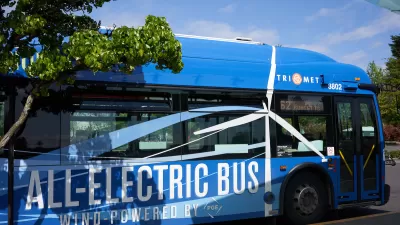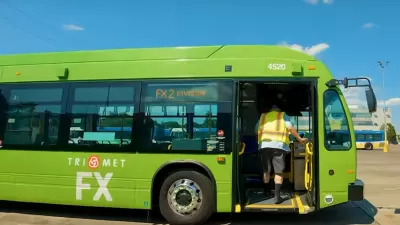A TriMet transit agency analysis has identified a culprit in the decline of transit ridership in Portland: gentrification and displacement.

Tom Mills and Madeline Steele, staff for Portland's TriMet transit agency, write a post for TransitCenter presenting evidence of a newly discovered correlation between rising housing costs and declining transit ridership.
TriMet is one of many transit systems around the country challenged by declining ridership. In Portland, such losses have already been blamed on "a diverse range of factors including changing employment levels and recession era fare increases and service cuts," according to Mills and Steele. But "TriMet’s analysis surfaced one driver of ridership loss that stood out among the rest: the impact of the economic displacement of low-income earners from inner city neighborhoods to first ring suburbs."
The article details the methodology of TriMet's analysis, and provides context on the recent history of the Portland housing market. Mills and Steele then state a key findings with potentially far-reaching implications for the trend of gentrification and urban revitalization in in other cities around the country. "We found substantial overlap between areas where real market home value increased and transit ridership decreased the most," they write, and "transit ridership grew in areas that saw minimal increases in real market home values."
To summarize: higher-wage earners moving into transit-rich neighborhoods use transit less that the lower-income residents who are departing these neighborhoods.
Hat tip to Angie Schmitt for sharing the article.
FULL STORY: In Portland, Economic Displacement May Be A Driver of Transit Ridership Loss

Planetizen Federal Action Tracker
A weekly monitor of how Trump’s orders and actions are impacting planners and planning in America.

Maui's Vacation Rental Debate Turns Ugly
Verbal attacks, misinformation campaigns and fistfights plague a high-stakes debate to convert thousands of vacation rentals into long-term housing.

Restaurant Patios Were a Pandemic Win — Why Were They so Hard to Keep?
Social distancing requirements and changes in travel patterns prompted cities to pilot new uses for street and sidewalk space. Then it got complicated.

In California Battle of Housing vs. Environment, Housing Just Won
A new state law significantly limits the power of CEQA, an environmental review law that served as a powerful tool for blocking new development.

Boulder Eliminates Parking Minimums Citywide
Officials estimate the cost of building a single underground parking space at up to $100,000.

Orange County, Florida Adopts Largest US “Sprawl Repair” Code
The ‘Orange Code’ seeks to rectify decades of sprawl-inducing, car-oriented development.
Urban Design for Planners 1: Software Tools
This six-course series explores essential urban design concepts using open source software and equips planners with the tools they need to participate fully in the urban design process.
Planning for Universal Design
Learn the tools for implementing Universal Design in planning regulations.
Heyer Gruel & Associates PA
JM Goldson LLC
Custer County Colorado
City of Camden Redevelopment Agency
City of Astoria
Transportation Research & Education Center (TREC) at Portland State University
Jefferson Parish Government
Camden Redevelopment Agency
City of Claremont





























